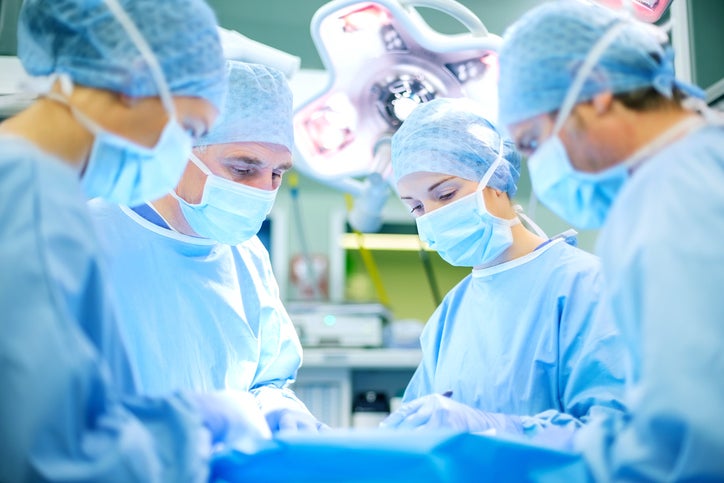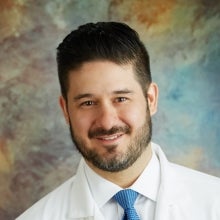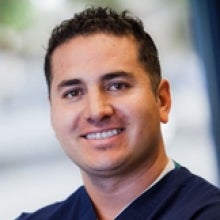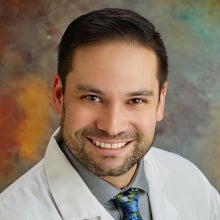
Surgical procedures
Welcome to Lovelace Health System's Surgery Center, where our surgical specialists provide advanced surgical care with compassion and expertise. Our board-certified surgeons specialize in a range of surgical procedures, utilizing minimally invasive techniques whenever possible for quicker recovery. From hernia repairs to colon cancer treatment, our experienced team ensures you are well-informed and supported throughout your surgical journey. Whether it's Achalasia or Weight-loss surgery, Lovelace offers state-of-the-art surgical services in Albuquerque and Roswell. Trust us for personalized care, cutting-edge technology, and a commitment to your swift recovery.
Our surgical services
Lovelace offers a wide variety of surgical services and state-of-the-art technology to ensure our patient's surgical needs are covered in Albuquerque and Roswell. Our highly skilled team of surgeons remains on the cutting edge of technology and procedures, providing care for a wide range of illnesses and conditions.
We provide the surgical treatments for the following conditions:
- Abscesses
- Cholecystitis
- Cholelithiasis (Gallstones)
- Colon cancer and colon polyps
- Cysts
- Diverticulitis/diverticulosis
- Dysphagia
- Fissures
- Fistulas (enterocutaneous, gastrocutaneous, and colocutaneous)
- Gallbladder dysfunction
- GERD/acid reflux
- Hemorrhoids
- Hernia (Hiatal or Paraesophageal)
- Lipoma
- Pancreatitis
- Rectal abscess
- Small Bowel Obstruction (SBO)
- Spleen
- Stoma/Ostomy
We understand surgery can seem scary, but our surgeons will sit down and talk with you about your procedure, answering any questions you may have and supporting you throughout your recovery. Our experienced staff will help make sure you are prepared the day of your surgery and let you know what to expect during your recovery. Our goal is to get you back to optimal health as soon as possible.
Minimally invasive surgery
Minimally invasive surgery combines your surgeon's understanding of anatomy with cutting-edge technology to treat a multitude of conditions using small incisions and the assistance of imaging. It is important to understand that the decision to receive minimally invasive surgery is individualized to the patient and the patient's symptoms. It is important to discuss with your physician whether minimally invasive surgery is right for you.
Minimally invasive surgery employs the latest in surgical and robotics technologies to perform routine and complex surgery – taking surgery beyond the limits of the human hand. This technology allows major surgical procedures to be performed through very small incisions. Benefits can include less pain, a shorter hospital stay, faster return to normal daily activities, reduced rates of infection, and the potential for better clinical outcomes.
Similarly, robot-assisted (robotic) surgery allows doctors to perform many types of complex procedures with more precision, control, and flexibility. Robotic surgery offers patients facing surgery many potential benefits over traditional open surgery. As with minimally invasive surgery, robotic surgery generally provides less pain and scarring, shorter hospital stays, and a faster recovery.
Da Vinci surgical system
The da Vinci Surgical System allows surgeons to offer an effective, minimally invasive option for complex surgical procedures. Small 1 – 2 centimeter incisions are used to introduce miniaturized wristed instruments and a high-definition 3-D camera. Your surgeon views a magnified, high-resolution 3-D image of the surgical site. At the same time, state-of-the-art robotic and computer technologies scale, filter and seamlessly translate your surgeon's hand movements into precise micro-movements of the robotic instruments. The system requires that every surgical maneuver be performed with direct input from your surgeon.
Lovelace Women’s Hospital is the first hospital in New Mexico to have earned the Surgical Review Corporation’s Center of Excellence in Robotic Surgery (COERS). The COERS program was developed to recognize surgeons and facilities worldwide performing robotic procedures and achieving defined standards for patient safety and care quality. The surgeons who are part of our Center of Excellence in Robotic Surgery as Master Surgeons are the first in New Mexico to achieve this designation and we are proud to recognize their achievements.
We use the da Vinci surgical system to treat a variety of conditions, including:
- Bladder cancer
- Cervical and uterine cancer
- Colon and intestinal surgery
- Endometriosis
- Gallbladder issues
- Kidney disorders or cancer
- Menorrhagia or excessive bleeding
- Prostate cancer
- Simple to complex hernia repairs, including complex abdominal wall hernias - all with small incisions and a quick recovery
- Stomach repairs
- Urinary blockage
- Uterine fibroids
- Uterine prolapse
Globus
The Globus ExcelsiusGPS offers the next revolution in robotic spine surgery for back pain relief. Robotic surgery improves accuracy and optimizes patient care by using a state-of-the-art combination of robotics and navigation. This technology offers a less invasive option for spine surgery, a reduction in radiation exposure for both the patient and the surgeon and a faster recovery period.
Click on a Doctor to View More Information
Overview

At Lovelace we understand surgery can seem scary. Whether you need surgery to repair a hernia, remove a gallbladder or treat colon cancer, our surgeons will sit down and talk with you about your procedure, answer any questions you may have and follow your recovery. Our experienced staff know how to help make sure you are prepared for the day of surgery and what to expect during your recovery. Our goal is to get you back to normal as soon as possible.
Our board-certified surgeons treat a wide range of medical conditions that require surgery, many with minimally invasive techniques. These techniques can help patients spend less time in the hospital and recover more quickly. The Lovelace surgical group offers treatment for these and other conditions:
- Achalasia
- Abscess
- Cholecystitis
- Cholelithiasis (Gallstones)
- Colon Cancer
- Colon Polyps
- Cyst
- Diverticulitis/Diverticulosis
- Dysphagia
- Enterostomy
- Fissure
- Fistulas (Enterocutaneous, gastrocutaneous, colucutaneous)
- Gallbladder Dysfunction
- Gastrostomy
- GERD/Reflux
- Hemorrhoids
- Hernia (Hiatal or Paraesophageal)
- Lipoma
- Pancreatitis
- Rectal Abscess
- Robotic Surgery
- Small Bowel Obstruction (SBO)
- Spleen
- Stoma/Ostomy
- Weight-loss surgery - Laparoscopic Gastric Sleeve, Laparoscopic Roux-en-Y (Gastric Bypass), Laparoscopic adjustable banding and LAP-BAND revisions
Lovelace offers a wide variety of surgical services and state-of-the-art technology to ensure our patient's surgical needs are covered in Albuquerque and Roswell. Our highly skilled team of surgeons remains on the cutting edge of technology and procedures.
To schedule an appointment or for more information, call 505.727.2727.
Click on a Doctor to View More Information
Traditional Surgery
Traditional Surgery
Traditional, or open, surgery involves an incision that is made using a scalpel. The surgeon then inserts the instruments and conducts the surgery. In some cases open surgery is preferable to provide the visual information required to completely remove tissues or accurately diagnose a condition, a larger incision may also be required to access a larger area in the body. It's important to discuss your options with your surgeon to find the best option for your care.
Lovelace offers a wide variety of surgical services and state-of-the-art technology to ensure our patient's surgical needs are covered in Albuquerque and Roswell. Our highly skilled team of surgeons remains on the cutting edge of technology and procedures.
Minimally Invasive & Robotic Surgery
Minimally Invasive Surgery
Minimally invasive surgery combines your surgeon's understanding of anatomy with cutting-edge technology to treat a multitude of conditions using small incisions and the assistance of imaging. Often minimally invasive surgery offers faster recovery times and reduced rates of infection. It is important to understand that the decision to receive minimally invasive surgery is individualized to the patient and the patient's symptoms. It is important to discuss with your physician whether minimally invasive surgery is right for you.
Minimally invasive surgical options use the latest in surgical and robotics technologies to perform routine and complex surgery – taking surgery beyond the limits of the human hand. This technology allows major surgery to be performed through very small incisions. Benefits can include less pain, a shorter hospital stay, faster return to normal daily activities and the potential for better clinical outcomes.
Robotic Surgery
Robotic surgery, or robot-assisted surgery, allows doctors to perform many types of complex procedures with more precision, control, and flexibility. Robotic surgery offers patients facing surgery many potential benefits over traditional open surgery, including less pain, less scarring, shorter hospital stays, and a faster return to daily activities.
da Vinci
The da Vinci® Surgical System allows surgeons to offer an effective, minimally invasive option for complex surgical procedures. Small 1 – 2 centimeter incisions are used to introduce miniaturized wristed instruments and a high-definition 3-D camera. Your surgeon views a magnified, high-resolution 3-D image of the surgical site. At the same time, state-of-the-art robotic and computer technologies scale, filter and seamlessly translate your surgeon's hand movements into precise micro-movements of the robotic instruments. The system requires that every surgical maneuver be performed with direct input from your surgeon.
Lovelace Women’s Hospital is the first hospital in New Mexico to have earned the Surgical Review Corporation’s Center of Excellence in Robotic Surgery (COERS). The COERS program was developed to recognize surgeons and facilities worldwide performing robotic procedures and achieving defined standards for patient safety and care quality. The surgeons who are part of our Center of Excellence in Robotic Surgery as Master Surgeons are the first in New Mexico to achieve this designation and we are proud to recognize their achievements.
Globus
The Globus ExcelsiusGPS offers the next revolution in robotic spine surgery for back pain relief. Robotic surgery improves accuracy and optimizes patient care by using a state-of-the-art combination of robotics and navigation. This technology offers a less invasive option for spine surgery, a reduction in radiation exposure for both the patient and the surgeon and a faster recovery period.
Frequently Asked Questions






















